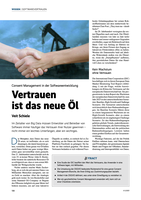«Trust is the new oil» in iX 03/2021
This is the central question of this article [1].
No growth without trust
In their European Data Market Monitoring Tool Report [2], the International Data Corporation (IDC) looked at the impact of a climate of trust on the European data economy. They map three different scenarios, whereby they see the most significant factor as the political framework conditions, more precisely data protection and privacy, the common digital market and openness, standardisation and interoperability of data. They expect the greatest growth with a globally applicable GDPR. So it becomes clear: it is not data that is the oil of the digital age, no, it is trust.
Incisive – the Corona Warning App
When, with the corona pandemic, the German government and the Robert Koch Institute (RKI) decided to introduce a contact tracing app, data protection moved into the consciousness of the general population: many feared being stigmatised as COVID-19 patients if this information was passed on to government agencies. Widespread public mistrust of the Corona warning app would have prevent the success. After all, in order to effectively break chains of infection, as many people as possible must use the tracing app. So a completely new question arose: How can we design the software so that enough people trust the app and use it every day?
In April, the Chaos Computer Club published ten touchstones for the assessment of contact tracing apps [3]. For the CCC, the social requirements include purpose limitation, voluntariness and non-discrimination, the protection of privacy as well as transparency and auditability. The technical requirements are the absence of a central entity that must be trusted, data economy, anonymity, no linking with personal data, movement and contact profiles, and confidentiality of communication. The federal government and the RKI did the only right thing: they listened to the advice of the data protectionists and decided – contrary to the original planning – in favour of such a decentralised and anonymous procedure. As expected, trust in the Corona warning app ends at the limits of the operating systems. Whoever controls the technical infrastructure has the power. And it still seems questionable whether and how European data protection standards can ever be enforced against US corporations.
Transparency and openness
In order to be able to judge in an informed way whether a programme fulfils its purpose and has no hidden functions, the source code must be publicly accessible. To ensure full transparency, not only the source code of the programme must be publicly accessible, but also all libraries, protocols and interfaces that a programme uses. The entire software architecture should be based on the open source model for this purpose.
Privacy by design, decentralisation and data sovereignty
If the first two requirements are met, the public can decide whether a software system offers privacy by design or not. Trustworthy software must protect the privacy of users from the outset.
No more blind trust
For decades, users have blindly trusted software manufacturers and service providers. This is different today:
«Software must earn our trust. The future therefore belongs to transparent open source development models that guarantee privacy by design and comprehensive data protection.»
– Veit Schiele, founder and CEO of the Cusy GmbH
| [1] | iX 03/2021: Vertrauen ist das neue Öl – Consent Management in der Softwareentwicklung |
| [2] | IDC: How the power of data will drive EU economy. The European Data MarketMonitoring Tool Report |
| [3] | CCC: 10 Prüfsteine für die Beurteilung von „Contact Tracing“-Apps |

